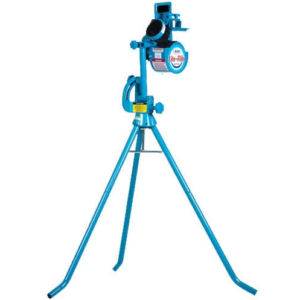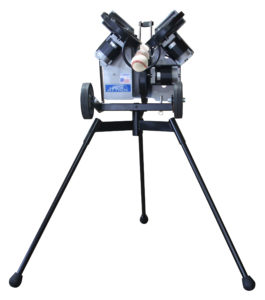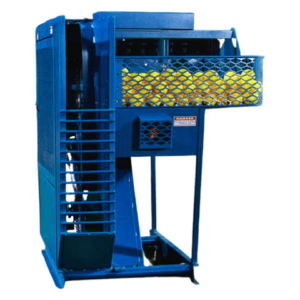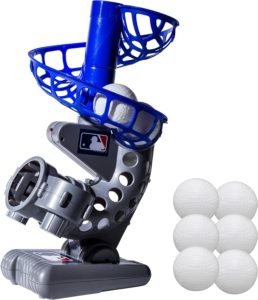Why Buy a Pitching Machine?
First things first: why should you even consider getting a pitching machine?
Imagine this: It’s a sunny Saturday afternoon, and you’re out in the backyard with your kid. They’re eager to practice their swing, but after a few pitches, your arm feels like it’s going to fall off. Or maybe you’re a coach who wants to ensure your players get consistent practice, but you can’t always rely on having someone available to pitch. This is where a pitching machine comes in handy. It provides consistent, reliable pitches and can help improve batting skills, timing, and confidence.
Types of Pitching Machines
Pitching machines come in various shapes and sizes, each catering to different needs. Here’s a rundown of the main types:
- Wheel-Based MachinesThese are the most common and versatile. They use one, two, or even three wheels to shoot the ball out at different speeds and angles. Perfect for both baseball and softball, they can throw fastballs, curveballs, sliders, and more.Personal Experience: I remember when my nephew got his first wheel-based machine. We spent hours in the backyard, adjusting the settings to mimic different pitches. The joy on his face when he finally hit a curveball was priceless!
- Arm-Style MachinesThese machines use a mechanical arm to pitch the ball, mimicking the actual motion of a pitcher. They’re great for younger players who need to get used to the visual of a real pitch coming their way.Pro Tip: If your goal is to help a young player get over the fear of facing a real pitcher, an arm-style machine can be a game-changer. It’s like having a real pitcher, but without the unpredictability.
- Compressed Air MachinesLess common but highly effective, these use air pressure to shoot the ball. They’re often quieter and can be easier to maintain since there are fewer moving parts.Question: Ever wondered why some machines sound like a jet engine taking off? That’s the wheel-based machine for you! Compressed air machines, on the other hand, are like the ninjas of the pitching world – silent but deadly accurate.
Let’s talk about each pitching in detail
Wheel-Based Pitching Machines

Wheel-based pitching machine | Jugs pitching machine

Wheel-based pitching machine | Hack Attack Pitching Machine
How Wheel-Based Pitching Machines Work?
Wheel-based pitching machines are the most common type and are highly versatile. They use one, two, or even three wheels to shoot the ball out at different speeds and angles. Here’s a basic rundown of how they function:
- Ball Loading: The ball is fed into the machine, either manually or via an automatic feeder.
- Wheel Acceleration: One or more wheels spin at high speeds, powered by an electric motor.
- Ball Propulsion: The ball is squeezed between the spinning wheels and propelled out towards the batter.
Benefits of Wheel-Based Pitching Machines
- VersatilityOne of the key advantages of wheel-based machines is their versatility. They can throw various types of pitches, including fastballs, curveballs, sliders, and even knuckleballs, depending on the model. This makes them suitable for a wide range of training scenarios.
- Personal Experience:I remember when my nephew got his first wheel-based machine. We spent hours in the backyard, adjusting the settings to mimic different pitches. The joy on his face when he finally hit a curveball was priceless!
- Adjustable Speed and Spin
These machines often come with adjustable speed settings, allowing you to simulate different pitch velocities. You can also adjust the wheel angles to create various spins and breaks, which is excellent for developing different hitting techniques. - Consistency and ReliabilityWheel-based machines are known for their consistency. Once you set the desired speed and spin, they can deliver pitch after pitch with the same accuracy. This consistency is crucial for effective practice and skill development.Question: Ever struggled with inconsistent pitches during practice? Wheel-based machines can eliminate that issue, providing reliable and predictable pitches every time.
- Suitable for All LevelsWhether you’re training little leaguers or college athletes, there’s a wheel-based machine to suit your needs. Models range from entry-level machines designed for young players to advanced models capable of simulating professional-level pitches.
Considerations When Choosing a Wheel-Based Machine
- Number of Wheels
Single-Wheel Machines: Typically more affordable and simpler to use, but they may have limitations in the types of pitches they can throw.
Two-Wheel Machines: More versatile, capable of throwing a variety of pitches with different spins and speeds.
Three-Wheel Machines: Offer the highest level of control and versatility, ideal for advanced training. - Speed RangeDifferent machines offer various speed ranges. For young players, a lower speed range (20-60 mph) is ideal. For high school or college players, look for machines that can pitch up to 90 mph or more.Fun Fact: Did you know some advanced machines can simulate the speed of a professional fastball? That’s right – you could be facing 100 mph pitches in your own backyard!
- Portability
Think about where you’ll be using the machine. If you need to move it around frequently, look for one with wheels and a manageable weight. Some compact models can even fit in your car’s trunk!
- Power Source
Most wheel-based machines are electrically powered, so you’ll need access to an outlet. Some models are battery-powered, offering more flexibility in where you can practice.
Budget Considerations
Wheel-based pitching machines can range from a few hundred to several thousand dollars. It’s important to set a budget before you start shopping. Remember, the most expensive machine isn’t always the best one for your needs.
Question: What’s your budget looking like? It’s good to have a number in mind so you can narrow down your options without breaking the bank.
Making the Final Decision
To choose the right wheel-based machine, start by listing your priorities: speed range, pitch types, portability, and budget. Then, do a bit of research on models that fit your criteria. Don’t forget to read reviews and, if possible, try out a few machines in person.
Personal Anecdote: When I was shopping for a pitching machine, I went to a local sports store and asked if I could test out a few models. The staff was super helpful, and being able to see the machines in action made a huge difference in my decision.
Bottomline
Wheel-based pitching machines offer a fantastic combination of versatility, consistency, and adjustability. They’re suitable for all skill levels and can simulate a wide range of pitches, making them an excellent choice for anyone serious about improving their batting skills. So, are you ready to hit those home runs? Let’s get started!
Remember, the right pitching machine is out there waiting for you. Happy shopping and even happier hitting!
—-
Arm-Style Pitching Machines

Arm-based pitching machine | Iron Mike Pitching Machine
How Arm-Style Pitching Machines Work?
Arm-style pitching machines use a mechanical arm to pitch the ball, closely mimicking the actual motion of a pitcher. Here’s a basic rundown of how they function:
- Ball Loading: The ball is manually placed into the machine, typically onto a mechanical arm.
- Arm Movement: The mechanical arm is pulled back and then released, simulating the motion of a human arm throwing the ball.
- Ball Propulsion: The ball is pitched towards the batter, with the arm’s motion providing the necessary speed and angle.
Benefits of Arm-Style Pitching Machines
- Realistic Pitch SimulationOne of the key advantages of arm-style machines is their ability to simulate the look and feel of a real pitcher. This can be particularly beneficial for young players who need to get accustomed to the timing and visual of a real pitch coming their way.Pro Tip: If your goal is to help a young player get over the fear of facing a real pitcher, an arm-style machine can be a game-changer. It’s like having a real pitcher, but without the unpredictability.
- Consistent DeliveryArm-style machines provide consistent pitch delivery, which is crucial for effective batting practice. The mechanical arm ensures that each pitch is delivered with the same speed and trajectory, helping batters to develop their timing and technique.
- Variety of PitchesMany arm-style machines can throw different types of pitches, such as fastballs, curveballs, and sliders. By adjusting the machine’s settings, you can vary the pitches to keep practice sessions challenging and engaging.Question: Ever wondered how to practice hitting different pitch types without a live pitcher? Arm-style machines can replicate a variety of pitches to help you improve.
- DurabilityThese machines are typically built to last, with sturdy components designed to withstand repeated use. This makes them a good investment for long-term training.
Considerations When Choosing an Arm-Style Machine
- Speed RangeCheck the machine’s speed range to ensure it matches the skill level of the players using it. Some machines offer adjustable speeds to cater to different age groups and skill levels.Fun Fact: Did you know that arm-style machines can simulate pitches as fast as those thrown by professional pitchers? You can practice against 90+ mph pitches right in your backyard!
- Ease of UseLook for a machine that’s easy to set up and adjust. The last thing you want is to spend half your practice time fiddling with settings. User-friendly controls and clear instructions can save you a lot of headaches.
- PortabilityThink about where you’ll be using the machine. If you need to move it around frequently, look for one with wheels and a manageable weight. Some compact models can even fit in your car’s trunk!Personal Tip: I once underestimated the weight of a pitching machine and ended up needing an extra pair of hands to lug it around. Trust me, portability is key!
- Power Source
Most arm-style machines are electrically powered, so you’ll need access to an outlet. Some models are battery-powered, offering more flexibility in where you can practice.
Budget Considerations
Arm-style pitching machines can vary widely in price, so it’s important to set a budget before you start shopping. Remember, the most expensive machine isn’t always the best one for your needs.
Question: What’s your budget looking like? It’s good to have a number in mind so you can narrow down your options without breaking the bank.
Making the Final Decision
To choose the right arm-style machine, start by listing your priorities: speed range, pitch types, portability, and budget. Then, do a bit of research on models that fit your criteria. Don’t forget to read reviews and, if possible, try out a few machines in person.
Personal Anecdote: When I was shopping for a pitching machine, I went to a local sports store and asked if I could test out a few models. The staff was super helpful, and being able to see the machines in action made a huge difference in my decision.
Bottomline
Arm-style pitching machines offer a unique and realistic pitching experience, making them an excellent choice for players who need to get used to facing a real pitcher. They provide consistent delivery, a variety of pitch types, and durability, making them a valuable investment for any serious player or coach. So, are you ready to take your batting practice to the next level? Let’s get started!
Remember, the right pitching machine is out there waiting for you. Happy shopping and even happier hitting!
If you have made up your mind and want to choose one between wheel-based pitching machine or a arm-style pitching machine and want to know what pitching machine in the market is best? Then check out our blog post, “
Comparing the Best Baseball Pitching Machines”.
—–
Compressed Air Pitching Machines

Compressed Air Pitching Machine
How Compressed Air Pitching Machines Work?
Compressed air pitching machines operate by using stored air pressure to propel the ball. Here’s a basic rundown of how they function:
- Air Compression: The machine uses an air compressor to build up pressure inside a chamber.
- Ball Loading: The ball is placed into a launching mechanism within the chamber.
- Release Mechanism: When the desired pressure is reached, the machine releases the air in a controlled burst, propelling the ball out of the chamber and towards the batter.
Benefits of Compressed Air Pitching Machines
- Quiet OperationOne of the most significant advantages of compressed air machines is their quietness. Unlike wheel-based machines, which can sound like a jet engine revving up, compressed air machines operate much more quietly. This can be a huge plus if you’re practicing in a residential area or simply prefer a quieter training environment.Question: Ever found yourself annoyed by the loud noise of machinery while practicing? A compressed air machine might just be the solution!
- Consistency and AccuracyCompressed air machines can be incredibly accurate, offering consistent pitch placement. The precise control over air pressure allows these machines to deliver consistent pitch speeds and locations, which is crucial for effective training.
- Low MaintenanceWith fewer moving parts compared to wheel-based and arm-style machines, compressed air machines tend to require less maintenance. There are no wheels or mechanical arms to wear out, which can mean fewer repairs and a longer lifespan.
- Portability
Many compressed air machines are designed to be compact and lightweight, making them easier to transport. Some models are battery-operated, adding to their portability and convenience.Personal Tip: If you plan on moving your pitching machine frequently or taking it to different practice locations, the portability of a compressed air machine can be a game-changer.
Considerations When Choosing a Compressed Air Machine
- Power Source
While some compressed air machines are battery-powered, others require an electrical outlet. It’s essential to consider where you’ll be using the machine and ensure you have access to a suitable power source. - Air Compressor Quality
- The quality of the air compressor is crucial for the machine’s performance. A reliable, high-quality compressor will ensure consistent air pressure and, consequently, consistent pitching.
- Speed Range and Adjustability
- Check the machine’s speed range and how easily you can adjust the pitching speed. Some machines offer a wide range of speeds, making them suitable for different skill levels and training needs.
- Pitch Types
- While compressed air machines excel in accuracy and consistency, they may offer fewer pitch types compared to some wheel-based machines. Consider whether you need a variety of pitches (like curveballs and sliders) and if the machine can accommodate that.
- Budget
- Compressed air machines can vary widely in price. Set a budget and look for a machine that offers the best value for your money, considering factors like durability, features, and brand reputation.
Who Should Buy a Compressed Air Pitching Machine?
Compressed air pitching machines are ideal for:
- Players and coaches who prioritize quiet operation: If noise is a concern, these machines are much quieter than their wheel-based counterparts.
- Those looking for low-maintenance options: With fewer moving parts, these machines generally require less upkeep.
- Individuals needing portability: Their compact design makes them easier to transport.
- Anyone seeking consistent and accurate pitches: The precise control over air pressure ensures reliable pitch delivery.
I once attended a baseball clinic where they used a compressed air machine for the pitching drills. The players loved the quiet operation, and the coach appreciated the machine’s consistent accuracy. It made for a smooth, effective practice session with minimal distractions.
Bottomline
Compressed air pitching machines offer a unique blend of quiet operation, consistency, low maintenance, and portability. They might not be as widely known as wheel-based or arm-style machines, but they’re certainly worth considering if these features align with your needs. If you’re looking for a reliable, low-noise solution for your pitching practice, a compressed air machine could be the perfect fit.
So, what do you think? Ready to explore the quiet and precise world of compressed air pitching machines? Happy shopping, and here’s to hitting those home runs!
Key Features to Consider
Now that we’ve covered the types, let’s talk about what features you should look for when buying a pitching machine.
- Speed RangeDifferent machines offer various speed ranges. For young players, a lower speed range (20-60 mph) is ideal. For high school or college players, look for machines that can pitch up to 90 mph or more.Fun Fact: Did you know some advanced machines can simulate the speed of a professional fastball? That’s right – you could be facing 100 mph pitches in your own backyard!
- Pitch TypesConsider a machine that offers a variety of pitches if you’re training for different scenarios. Being able to switch between fastballs, curveballs, and sliders can make practice sessions much more effective.
- PortabilityThink about where you’ll be using the machine. If you need to move it around frequently, look for one with wheels and a manageable weight. Some compact models can even fit in your car’s trunk!Personal Tip: I once underestimated the weight of a pitching machine and ended up needing an extra pair of hands to lug it around. Trust me, portability is key!
- Power SourceSome machines are battery-powered, while others need an electrical outlet. If you’re practicing at a field without easy access to power, a battery-operated machine might be the best option.
- Ease of UseLook for a machine that’s easy to set up and adjust. The last thing you want is to spend half your practice time fiddling with settings. User-friendly controls and clear instructions can save you a lot of headaches.
Making the Final Decision
So, how do you choose the right machine? Start by listing your priorities: speed range, pitch types, portability, and budget. Then, do a bit of research on models that fit your criteria. Don’t forget to read reviews and, if possible, try out a few machines in person.
Conclusion
Buying a pitching machine is a fantastic step towards improving your baseball or softball skills. By understanding the different types, key features, and your personal needs, you can find a machine that will serve you well for years to come. So, are you ready to hit those home runs? Let’s get started!
Remember, the right pitching machine is out there waiting for you. Happy shopping and even happier hitting!
PS
Did you know, that you can list your backyard batting cage on Cagelist.com and earn money by renting it out to other players? The higher the quality and safety of your batting cage and the resources it provides potential renters, the higher the hourly rate you will be able to charge for it.
Want to see other batting cage projects to get inspiration and get helpful tips to help you complete your project?
Join our backyard batting cages facebook group and subscribe to our CageList blog.
